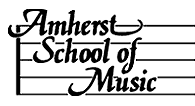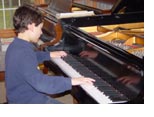

www.Amherstschoolofmusic.org • 716-866-7832 • East Amherst, NY • Steven A. Bianchi, Director
About UsThe History and Philosophy of the Amherst School of Music, Inc.
Students at the ASM are offered the opportunity to perform frequently. The school offers three formal recitals at Denton, Cottier and Daniels and one performance class, which is less formal than the recitals. They are held at Vinecroft Retirement Community in Clarence. All of these opportunities are optional, but we have found that when these performances are made use of, a higher level of progress and enthusiasm usually follows. Parents are usually excited to see their children perform, subsequently, the excitement rubs off on the child and a more focused reason for the lessons is realized. Although some of our students go on to study music at universities and become professionals, most do not. The teachers here recognize that most students take music lessons to enrich their lives and not as a means to a vocation. Our primary goal is to help the student to experience the beauty and excitement of music and to learn a valuable work ethic. Everyone can enjoy making music and can do so proficiently, but a great deal of work and discipline is required. In other words, learning music has a very steep learning curve. Studying music has wonderful residual side effects. Studies with pre-schoolers have shown that those given piano lessons greatly developed their mathematical skills. Also, it is a wonderful emotional outlet. All the arts have in common the attribute of helping the participant to communicate emotions and feelings that can be hard to bring out in everyday activities and communication. Also, to be able to understand and access the great music literatures of the 17th, 18th, 19th, and 20th centuries are a wonderful skill to possess. We feel that frequent performances coupled with diligent, consistent practicing can lead to a great feeling of accomplishment and success with music. More specifically, Mastery Teaching techniques are the primary tool for developing the curriculum for each student. A certain skill or concept will be worked at until it is understood or “mastered”, then the next skill may be introduced, worked at and mastered. Thus, there is no required curriculum that must be followed in the first, second, etc. years. In addition, the student’s interest, talent, work ethic and amount of time spent practicing all have an effect on the direction the studies will take. A flexible and knowledgeable instructor who can easily adapt is a key ingredient in the process. Another vital component in this process is the communication between the parent of the student, the student and the teacher. It is important for the parents to tell the teacher about what is happening in the home environment. This can greatly impact what sort of assignments the teacher gives the student. |



 The Amherst School of Music, Inc. is a community based not-for-profit corporation founded in 1987. It provides musical instruction to primarily school age children in the metropolitan Buffalo area. Adult instruction is also provided by a few of the instructors. The teachers teach in a “traditional” style. This means the curriculum is developed around the strengths, interest and talent of the student. The faculty at the ASM is mostly comprised of professional teachers whose primary vocation is music education. Many are graduates of music conservatories from various countries.
The Amherst School of Music, Inc. is a community based not-for-profit corporation founded in 1987. It provides musical instruction to primarily school age children in the metropolitan Buffalo area. Adult instruction is also provided by a few of the instructors. The teachers teach in a “traditional” style. This means the curriculum is developed around the strengths, interest and talent of the student. The faculty at the ASM is mostly comprised of professional teachers whose primary vocation is music education. Many are graduates of music conservatories from various countries.